Archive for the ‘ICT’ Category
 |
3. February 2011 – 00:06 by Francesco Molinari
|
On January 31st, a group of academic researchers, city managers and consultancy professionals was gathered into a single-day expert advisory meeting led by IPTS, the European Commission’s Institute on Prospective Technological Studies, and Eurocities, the network of major European cities, to discuss and evaluate the preliminary results of an exploratory study carried out jointly by the two organisations over the past couple of years.
The study, called EXPGOV, has by now collected a huge amount of evidence on the most likely areas of impact of ICT on governance, based on a survey of about 60 out of 446 EU cities with 100,000 inhabitants or more from all 27 Member States (plus Croatia and Switzerland), and later on the preparation and analysis of four detailed case studies (Barcelona, Berlin, Manchester, and Tallin), the results of which were presented for the first time during the meeting.
In my opinion, the big merit of this effort is to have raised the issue of assessing ICT impact on middle- and large- sized city governance on a systematic basis in Europe – probably for the first time ever, as strange as this may appear. In that respect, it is a preliminary answer given to the key questions: “Where do we stand? Where should we go?” and also the photograph of work in progress, showing a fair deal of convergence between old and new Member States, south and north of Europe, relatively larger and smaller communities, both in terms of problems tackled with and solutions offered to approach them. Particularly the survey questionnaire (which was anonymously filled out by several kinds of stakeholder, including city managers or their delegates) provided evidence of a number of “flagship projects” that must have been making the difference in a number of European city contexts.
Read the rest of this entry »
Posted in ICT, News, Trends | No Comments »
 |
2. December 2010 – 11:49 by Centre for E-Government
|
On authors’ demand, CeDEM11 announces an extended deadline for submissions:
16 January 2011
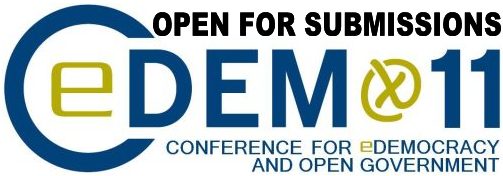
Conference for E-Democracy and Open Government
5-6 May 2011
Krems, Austria
www.donau-uni.ac.at/cedem
Tracks
- E-Participation
- Open Data and Open Access
- Open Government
- E-Voting
Submissions
- Extended deadline: 16 January 2011
- 12 pages maximum
- Double-blind peer review
Conference Proceedings
- Print version and
- OA online version (eBook).
- Best papers will be published with the OA eJournal JeDEM
Detailed Information
Posted in Events, ICT, open data | No Comments »
 |
8. September 2010 – 22:40 by Institute for Electronic Participation
|
 According to the latest UN E-Participation Index measurement, the majority of South Eastern European countries improved their global standing regarding the quality and usefulness of information and services for the purpose of engaging its citizens in public policy making through the use of e-government programs. Nevertheless, e-participation in SEE countries is still falling behind their e-government developments. An overview of current e-participation situation in SEE within government domain will be presented, highlighting key elements needed for strengthening e-democracy in the region. One of them will be focused on non-governmental organizations and civil society e-participation experience (e.g. on-line Citizen’s forum) needed for shaping inclusive and citizens oriented e-government policy.
According to the latest UN E-Participation Index measurement, the majority of South Eastern European countries improved their global standing regarding the quality and usefulness of information and services for the purpose of engaging its citizens in public policy making through the use of e-government programs. Nevertheless, e-participation in SEE countries is still falling behind their e-government developments. An overview of current e-participation situation in SEE within government domain will be presented, highlighting key elements needed for strengthening e-democracy in the region. One of them will be focused on non-governmental organizations and civil society e-participation experience (e.g. on-line Citizen’s forum) needed for shaping inclusive and citizens oriented e-government policy.
Link to video lecture: https://videolectures.net/forum2010_delakorda_meis/
Link to presentation: https://www.inepa.si/images/stories/mapping_edemocracy_see_region_delakorda.pdf.
Lecture presented by Simon Delakorda, M. Sc., executive director, Institute for Electronic Participation (INePA) and member of the Central and Eastern Citizens Network eParticipation expert group.

Posted in Events, experince, good practice, ICT, members, News, Projects, Tools, Trends | No Comments »
 |
8. September 2010 – 16:13 by Centre for E-Government
|
CeDEM11 – Conference for e-democracy, e-participation and e-voting – brings together e-democracy, e-participation and e-voting specialists working in academia, politics, government and business.
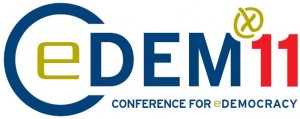
Call for Papers
During the last 10 years, the world has focused on social media and the new forms of societal behaviour, including content generation, collaboration and sharing as well as network organisation. These behaviours and expectations, in particular transparency and access to data, new ways of interacting with government and democratic institutions will continue to develop, and profound changes in society are to be expected. Society has been confronted with “Open Government”, “Open Data” and “Open Access”. What have the experiences been so far? How do these impact society, democratic structures and organisations? What changes occur at citizen level? What are the implications for democracy, society, science and business?
CeDEM11 presents the following tracks, which focus on these changes:
Track: E-participation
Co-chairs: Julia Glidden (21c Consultancy, UK) and Jeremy Millard (Danish Technological Institute, DK)
Track: Open Access and Open Data
Co-chair: Andy Williamson (Hansard Society, UK)
Track: Open Government
Co-chairs: Philipp Müller (University of Salzburg, Business School, AT) and Axel Bruns (Queensland University of Technology, AUS)
Track: E-voting
Co-chairs: Melanie Volkamer (Technical University Darmstadt, GER) and Thad Hall (University of Utah, USA)
.
Deadline for submissions of papers and workshop proposals is 1 December 2010. Submissions shall be 12 pages maximum.
Read the rest of this entry »
Posted in Events, ICT, open data, Projects | No Comments »
 |
6. August 2010 – 17:28 by Institute for Electronic Participation
|
E-participation & E-democracy workshop was organized as a part of the Citizens Participation University 2010 which took place from 20th to 24th of July in the Civil College in Kunszentmiklós-Kunbábony (Hungary).
10 NGOs representatives and activists from Armenia, Belgium, Hungary, Slovakia, Slovenia, Serbia, Poland and Romania attended the workshop.
Participants were introduced with E-participation / E-democracy concept, political documents of the Council of Europe relating to eDemocracy, current e-participation developments in Central and Eastern Europe and different e-participation tools as well as good practices. The second part of the workshop facilitated open discussion about opportunities for involving e-participation tools into current and future civil society projects in the region.
The workshop was lead by Mr. Csaba Madarász (e-democracy expert and consultant, Hungary) and Mr. Simon Delakorda, M.Sc. (Institute for Electronic Participation, Slovenia)
Citizens Participation University 2010 was organized by the Civil College Foundation and Central and Eastern European Citizens Network (CEE CN).
Csaba Madarász and Simon Delakorda
Workshop presentations:
1. eParticipation in the CEE: NGO’s perspective (pdf, 4,10 mb).

Citizens Participation University 2010 participants @ CEE CN

Simon Delakorda and Csaba Madarász @ CEE CN
Posted in Events, experince, good practice, ICT, members, Tools, Trends | No Comments »
 |
2. August 2010 – 23:16 by Asociacion Ciudades Kyosei / Pedro Prieto-Martin
|
[Once again, this post is specially aimed at people that are able to read in Spanish]
The 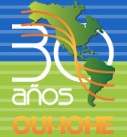 Asociación Ciudades Kyosei, in collaboration with the Inter-American Training Network on e-Government (which belongs to the prestigious Inter-American Organization for Higher Education), will soon host a virtual course titled “Citizen Participation and ICT: an experience of critical immersion in 21st Century’s Citizen Participation”.
Asociación Ciudades Kyosei, in collaboration with the Inter-American Training Network on e-Government (which belongs to the prestigious Inter-American Organization for Higher Education), will soon host a virtual course titled “Citizen Participation and ICT: an experience of critical immersion in 21st Century’s Citizen Participation”.
The course materials are written in Spanish, which will be the main language of instruction too; however, student’s contributions in English and Portuguese will also be fully welcomed.
The course is aimed at public sector’s technical staff, politicians, elected representatives, academics and members of civil society organizations whose work is linked with the design, implementation or execution of eParticipation/Participation projects and programs, or which have a special interested in Civic Participation and the possibilities offered by new communication technologies to strengthen it.
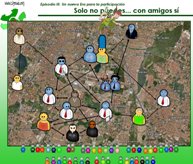 By combining students with different professional backgrounds and geographical extractions, we intend to create groups that provide a rich and varied environment for learning.
By combining students with different professional backgrounds and geographical extractions, we intend to create groups that provide a rich and varied environment for learning.
Participants will thus not only acquire a solid and irreverent understanding of (e)Participation, but will also have the opportunity to reflect and exchange perspectives and experiences with people from different countries and cultures.
As part of the course practical assignments, they will also contribute to the collaborative design of the Kyosei-Polis system, a municipal (e)Participation environment that our Association is planning to build after the course.
The tutoring team is integrated by Pedro Prieto-Martín (Spain), Mariángela Petrizzo (Venezuela) and Antonio Alberto Teixeira (CE, Brazil).
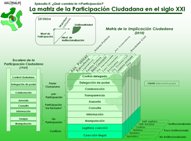 If you need any further information, you can consult the Course fact sheet (pdf, 5 pgs.) or even the Student Guide (pdf, 15 pgs.), which contains all relevant infos including detailed information about the course’s syllabus.
If you need any further information, you can consult the Course fact sheet (pdf, 5 pgs.) or even the Student Guide (pdf, 15 pgs.), which contains all relevant infos including detailed information about the course’s syllabus.
You can also write us with your questions at info@ckyosei.org.
The course will take place between the 13. of September and the 31. of October, lasting 7 weeks. The enrollment -which costs 150 US$- can be performed at the following registration page.
PS: I’ve been informed that 10 partial scholarships will be granted, where it is required (participation would thus cost just 75 US$). The form to apply for the scholarship is available here.
Posted in Events, ICT, Partners, Trends, Visions | 2 Comments »
 |
17. June 2010 – 15:19 by Centre for E-Government
|
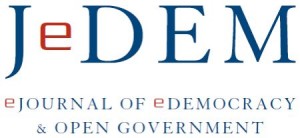 Extended Call For Papers – eJournal of eDemocracy and Open Government (JeDEM)
Extended Call For Papers – eJournal of eDemocracy and Open Government (JeDEM)
Issue 3/ September 2010
Special Issue in Collaboration with
PEP-NET: Sustainable eParticipation
Guest Editors
- Rolf Luehrs (PEP-NET, TuTech Innovation GmbH, D)
- Francesco Molinari (SmartIntuitions Ltd., CY)
The eJournal of eDemocracy and Open Government addresses the theory and practice in the areas of eDemocracy and Open Government as well as eGovernment, eParticipation, eDeliberation and eSociety. The aim is to impact the quality, visibility, efficiency and use of research and work in eDemocracy, Open Government and related fields.
Call for Papers
The past decade has seen a significant increase in the number, variety and quality of eParticipation trials, particularly in Western and Southern European countries. The impulse of the European Parliament and the financial support by the Commission have been instrumental in establishing a pan-European community of practice, made up of academia, governments and solution providers from virtually all EU Member States.
Read the rest of this entry »
Posted in experince, good practice, ICT, News, open data | No Comments »
 |
15. June 2010 – 10:13 by E-Voting.CC
|
 Our “EVOTE” Conferences have become an international meeting point for e-voting experts worldwide. This year’s “EVOTE2010″ will be the fourth of it’s kind.
Our “EVOTE” Conferences have become an international meeting point for e-voting experts worldwide. This year’s “EVOTE2010″ will be the fourth of it’s kind.
Today, June 15, the reduced early registration fee ends! (300€ including social events)
From June 16 the price will be 360€.
In order to get the discounted fee, register online today!
The 4. International Conference on Electronic Voting will be held from July 21 to 24 of 2010 in Bregenz, Austria. Please have a look at our internationally casted conference programme here.
We are looking forward to seeing you at the conference in July – so register now!
Daniel Botz – EVOTE2010 Conference Manager
Posted in Debate Europe, Events, experince, ICT, News, Projects, Uncategorized | No Comments »
 |
14. May 2010 – 22:07 by Civil College
|
opinion of Madarász Csaba
However the debate is reaching new heights by the expressed needs of the European Civil Society actors – gathered last week in Salzburg at the European Citizen’s Initiative Summit 2010 - by formulating the fears and proposed changes in the Salzburg Manifesto and presented at the public hearing yesterday organized in Bruxelles.
European Civil society is now criticising various aspects of the Commission proposed regulation, such as the admissibility check procedure, the provided time for the consultation, the needed infrastructure. The vast citizen group is putting attention to the forthcoming challenges: they have already started to build the needed infrastructure to support the practical application of the ECI (read more about it in the Manifesto).
(grab the documents here)
Ladies and Gentlemen! Dear Collegues!
I am wondering, where are we eGovernment, eParticipation and eDemocracy experts in this process? I mean, do we know, what the ECI is about? I am not really sure..But if we get know it’s current state, we might start to feel the natural challenge, to improve it..
What sort of challenge?
To lift ECI, the direct democratic instrument from 0.1 to ECI2.0: with the support of eGovernment.
The current verision of the Commission’s draft regulation is really not designed to our age – I have a personal impression, that communication is not really good between the different DGs. I do not know, what other reasons could limitthe current vision of the ECI, and preventing it to become a flagship of European trans/policy-governmental project. It really could be!But how?
Here is my recipe:
0. we have the heat and the need coming from citizens to cook together (policy), - this is the ECI
1. We have the Malmö Ministerial declaration, which is showing the path to countries (and even the European Commissioin) towards the web 2.0 and citizen friendly governance (by the way, the Hungarian Government, or responsible actors did not even translated it into Hungarian! Does this makes sense? I mean, do really citizens has to monitor these sort of things??)
2. We have the spice making it tasty for “upgrading” public services in Europe: it is the Open Declaration on Public Services
3. We aslo have the recently adopted Granada Declaration – highlighting the need for e-IDs and e-Signatures, interoperability and open standards, making the issue accessible and interoperable.
4. We also have the EIS - the European Interoperability Strategy as a technical bowl for these kind of issues, like the ECI
So what’s now?
I think it is time to move in. This ship can go, and all the money, that EU has spent on eDemocracy and eParticipation networks, projects, policy and research could loose it’s value if we do not stand up for the needed and obvious improvement of the first direct democracy instrument, provided after the Lisbon Treaty.
This is the practical time, when we need to add our knowledge to the process. No need to fear, it is time for change.
Directions
Questions regarding positioning the ECI 2.0:
- Is ECI a serivce of Governments or the European Government? Is European Commission a governing organization?
- If it is (any of the above) than ECI is a service for citizens and it is related to eGovernment, eDemocracy and eParticipation!
- If it is related to the areas – why we have not heard the existing expert networks opinion on this issue? EC pays a lot to sustain, create these networks. EC has to ask advice not only in the light of recent declaration from us on how to create the best ECI!
- Does the EC play and administrative role? If yes, than these recently adopted declarations and recommendations are also true for the EC. We need to take a fresh look on the ECI-EC relation in accordance to the questions lifted here!
Important facts about ECI 2.0:
Core technical basics
- In align with European Strategy for Interoperability of public services, interoperable system for the management of initiatives need to lay down the basics of ECI 2.0 (this means a standardized interface and functionality, which can be embedded and reached from various portals – for example the one-stop-shop egovernment portals/central government websites after “regular”, national authentication)
- The application should be based on open standards for further development by independent parties (we need APIs!)
- The system shall pave the way or embed the basics of the European-e-ID
Core designing basics
- design the service with different stakeholders
- set the basic technical framework and apply the best corwdsourcing methodologies to engage interested countries, developers …
- make it a good governance example!
We should not forget, why else eGovernment is important:
1. With the right approach to develop a supporting system – framework for ECI 2.0 -, the time needed for international signature collection, verification can be dramatically reduced
2. Costs related to campaigning and organizing can be also cut back seriously, by embedded supporting instruments (even created by the civil society)
3. ECI 2.0 approach takes down the responsibility from the organizers shoulder to provide a secure and reliable electronic system for collecting and validating signatures.
4. ECI 2.0 becomes an intergovernmental and G2C, C2C, G2G service – which means, that any country/provider can develop extra functionalities for making the application better (later about these)
5. ECI 2.0 can save a lot of trees, energy and water.
How can ECI 2.0 save our European trees, reduce water and energy consumption?
- using the possibilities of e-government and e-administration is an eco friendly approach
- 1 000 000 signature on the current format needs approximately 1million sheets of A4 paper.
- that means 4 tons of paper/initiative which app. means (if it is white paper) 8800 kgs of wood, 140000 liter of water, and 32000 kW of energy from the production side.
- extra costs and ecological footprint of moving, storing and guarding papers and their human “partners”
Please comment and check some of the related videos here:
https://eci.mirocommunity.org/
Posted in ICT, Projects, Trends, Visions | No Comments »
 |
12. May 2010 – 23:39 by Francesco Molinari
|
Major Cities of Europe – IT Users Group, the European association of Local Government CIOs and Public Officials, together with the City of Berlin and Vitako, the association of German public ICT service providers, announces the 2010 joint European Local Government Conference to be held on June 7th to 9th in Berlin at the Rotes Rathaus.
The conference will introduce some key European experiences of Local Government transformation that are aiming to a high quality and cost effective public administration. A variety of strategies, initiatives, and projects focused on providing valued services designed on the needs of constituents and leveraging the value of ICT.
Conference topics will be:
On June 7th / afternoon
- Strategies and Projects from Germany
On June 8th & 9th / morning – “The European Days”
- Electronic Document Management (June 8th / morning)
- Marketing and Acceptance of e-Government Services (June 8th / afternoon)
- New Ways of Organizing the Production of Public Services: Public Administration as a Collaborative Network (June 9th / early morning)
- A “Smart City” to Serve the Community, the Environment and the Economic Development (June 9th / final morning session)
Registration is open at www.majorcities.eu in the section dedicated to the Berlin Conference, where you can also find the full program and information on accommodation.
Enjoy!
Posted in ICT, News | No Comments »









 If you need any further information, you can consult the
If you need any further information, you can consult the 








